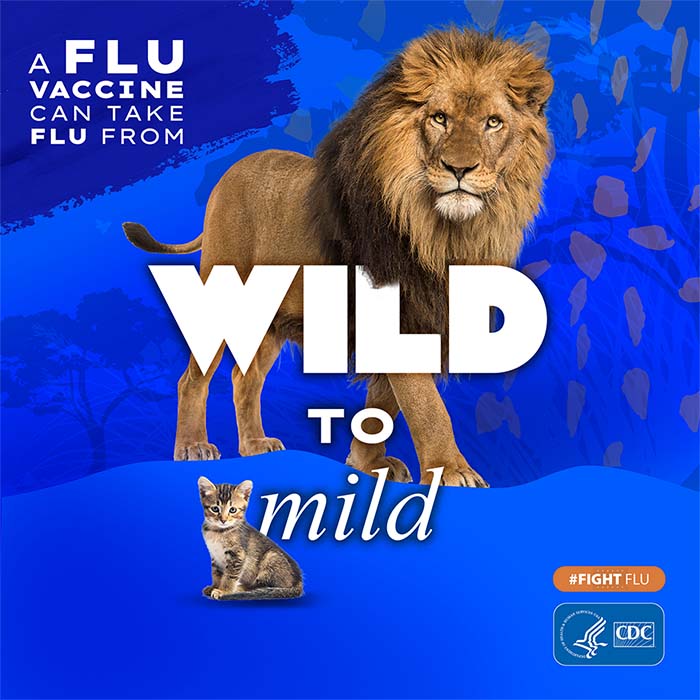Flu: What To Do If You Get Sick
Flu can cause mild to severe illness, and at times can lead to death. Flu symptoms usually come on suddenly. People who have flu often feel some or all of these signs and symptoms:
- fever* or feeling feverish/chills
- cough
- sore throat
- runny or stuffy nose
- muscle or body aches
- headaches
- fatigue (tiredness)
- some people may have vomiting and diarrhea, though this is more common in children than adults.
*It’s important to note that not everyone with flu will have a fever.
More information is available at Flu and COVID-19 symptoms.
What should I do if I get sick?
Most people with flu have mild illness and do not need medical care or antiviral drugs. If you get sick with flu symptoms, in most cases, you should stay home and avoid contact with other people except to get medical care.
If, however, you have symptoms of flu and are in a group at higher risk of serious flu-related complications, or are very sick or worried about your illness, contact your health care provider .
Certain people are at higher risk of serious flu-related complications (including young children, people 65 and older, pregnant people, and people with certain medical conditions). For a full list of people at higher risk of serious flu-related complications, see People at Higher Risk of Developing Flu–Related Complications. If you are in a group at higher risk and develop flu symptoms, contact your doctor early in your illness. Remind them about your higher-risk status for flu. CDC recommends that people at higher risk for serious flu-related complications should get antiviral treatment as early as possible, because benefit is greatest if treatment is started within 2 days after illness onset.
Do I need to go to the emergency room if I am only a little sick?
No. The emergency room should be used for people who are very sick. You should not go to the emergency room if you are only mildly ill.
If you have emergency warning signs of flu sickness, you should go to the emergency room. If you get sick with flu symptoms and are at higher risk of serious flu complications or you are concerned about your illness, call your health care provider for advice.
People experiencing any of these warning signs should obtain medical care right away.
In children
- Fast breathing or trouble breathing
- Bluish lips or face
- Ribs pulling in with each breath
- Chest pain
- Severe muscle pain (child refuses to walk)
- Dehydration (no urine for 8 hours, dry mouth, no tears when crying)
- Not alert or interacting when awake
- Seizures
- Fever above 104°F
- In children less than 12 weeks, any fever
- Fever or cough that improve but then return or worsen
- Worsening of chronic medical conditions
In adults
- Difficulty breathing or shortness of breath
- Persistent pain or pressure in the chest or abdomen
- Persistent dizziness, confusion, inability to arouse
- Seizures
- Not urinating
- Severe muscle pain
- Severe weakness or unsteadiness
- Fever or cough that improve but then return or worsen
- Worsening of chronic medical conditions
Are there medicines to treat flu?
Yes. There are drugs your doctor may prescribe for treating flu called “antivirals.” These drugs can make you better faster and may also prevent serious complications. See Treatment – Antiviral Drugs for more information.
How long should I stay home if I’m sick?
You can go back to your normal activities when, for at least 24 hours, both are true:
- Your symptoms are getting better overall, and
- You have not had a fever (and are not using fever-reducing medication).
After these two criteria are met, there are some additional precautions that can be taken to protect others from respiratory illness. More information is available at About Preventing Spread of Respiratory Viruses When You’re Sick.
Notes:
- People with flu are most contagious during the first 3 days of their illness. Some people, including young children and people with weakened immune systems may be contagious for longer periods of time.
- Not everyone with flu will have a fever. People with suspected or confirmed flu, who do not have a fever, should stay home from work at least 5 days after the onset of symptoms.
Avoid giving aspirin to children and teenagers
CDC recommends that children and teenagers (anyone aged 18 years and younger) who have flu or are suspected to have flu should not be given Aspirin (acetylsalicylic acid) or any salicylate containing products (e.g. Pepto Bismol); this can cause a rare, very serious complication called Reye’s syndrome. More information about Reye’s syndrome can be found here.
What should I do while I’m sick?
Stay away from others as much as possible to keep from infecting them. If you must leave home, for example to get medical care, cover coughs and sneezes with a tissue. Wearing a mask is an additional prevention strategy that you can choose to further protect yourself and others. When worn by a person with an infection, masks reduce the spread of the virus to others. Masks can also protect wearers from breathing in infectious particles from people around them. Wash your hands often can also help you keep from spreading flu to others. Take other everyday preventive actions to stop the spread of germs. This also can include taking steps for cleaner air and hygiene practices like cleaning frequently touched surfaces. More information is available about core and additional prevention strategies.



